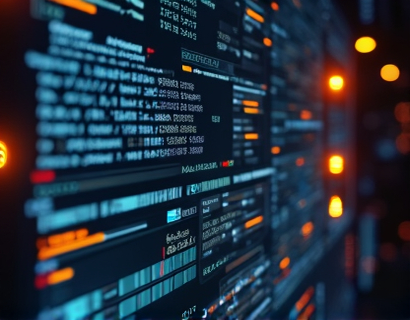AI and Crypto: Powering the Future of Digital Finance with Intelligent Solutions
The intersection of artificial intelligence (AI) and cryptocurrency is igniting a transformative shift in the landscape of digital finance. This convergence is not just a technological curiosity but a pivotal evolution that is reshaping how we perceive, interact with, and utilize financial systems. As tech enthusiasts and innovators, understanding this synergy is crucial for navigating the future of finance. This article delves into the intricate ways AI and cryptocurrency are merging to create intelligent FinTech solutions that are redefining the boundaries of digital finance.
Understanding the Basics: AI in Finance
Artificial intelligence, a branch of computer science focused on creating machines that can perform tasks requiring human intelligence, has found a fertile ground in the financial sector. AI encompasses machine learning, natural language processing, and predictive analytics, each playing a vital role in enhancing financial services. In the context of cryptocurrency, AI's capabilities are harnessed to manage, analyze, and predict market trends, automate trading, and ensure security.
One of the primary applications of AI in finance is in the realm of predictive analytics. By analyzing vast datasets, AI algorithms can identify patterns and trends that humans might overlook. This capability is invaluable in the volatile world of cryptocurrency, where market movements can be erratic and unpredictable. AI-driven predictive models can forecast price movements, helping investors make more informed decisions and potentially increasing their returns.
Enhancing Security with AI
Security is a paramount concern in the cryptocurrency space, given the decentralized and often anonymous nature of transactions. AI plays a crucial role in bolstering security measures by detecting and mitigating threats in real-time. Machine learning algorithms can analyze transaction patterns to identify anomalies that may indicate fraudulent activity. This proactive approach to security is essential for building trust in cryptocurrency as a viable financial instrument.
Moreover, AI-powered systems can enhance the security of blockchain networks, the underlying technology of cryptocurrencies. By monitoring network activity and identifying potential vulnerabilities, AI can help prevent attacks and ensure the integrity of the blockchain. This is particularly important as the adoption of blockchain technology expands beyond cryptocurrency into areas like supply chain management and identity verification.
Automating Trading with AI
Automated trading, or algorithmic trading, is another area where AI is making significant strides in the cryptocurrency market. AI algorithms can execute trades based on predefined criteria, operating 24/7 without the emotional biases that often affect human traders. This automation not only increases efficiency but also allows for faster execution of trades, which is crucial in the fast-paced cryptocurrency markets.
One of the key benefits of AI-driven trading is its ability to adapt to changing market conditions. By continuously learning from new data, these algorithms can refine their strategies to optimize performance. This adaptability is particularly useful in the cryptocurrency space, where market conditions can shift rapidly due to news, regulatory changes, or technological advancements.
Case Study: AI in Cryptocurrency Trading
A notable example of AI in cryptocurrency trading is the use of deep learning models for trend prediction. These models analyze historical price data, volume, and other relevant factors to forecast future price movements. A study by a leading financial institution demonstrated that AI-driven trading strategies outperformed traditional methods by a significant margin, highlighting the potential of AI in enhancing trading outcomes.
Another case involves the use of natural language processing (NLP) to analyze news articles, social media posts, and other textual data sources. By gauging sentiment and identifying key events, AI can provide real-time insights that inform trading decisions. This integration of qualitative data with quantitative analysis offers a more comprehensive view of market dynamics.
AI in Cryptocurrency Management
Beyond trading, AI is revolutionizing the way individuals and institutions manage their cryptocurrency portfolios. Robo-advisors, powered by AI, offer personalized investment advice and portfolio management services. These platforms use machine learning to understand user preferences, risk tolerance, and financial goals, tailoring investment strategies accordingly.
Portfolio optimization is another area where AI excels. By analyzing a wide range of factors, including market conditions, asset correlations, and economic indicators, AI can suggest the optimal allocation of assets to maximize returns while minimizing risk. This level of precision is particularly valuable for institutional investors managing large cryptocurrency portfolios.
Personalized Financial Insights
A user-centric approach is at the heart of AI-driven cryptocurrency management. Platforms leveraging AI can provide users with real-time insights and recommendations based on their specific circumstances. For instance, an AI system might alert a user to potential tax implications based on recent transactions or suggest diversification strategies to balance their portfolio. This personalized touch enhances the user experience and fosters greater engagement with cryptocurrency services.
Furthermore, AI can simplify the complex process of cryptocurrency management for novice investors. By breaking down data into understandable insights and actionable advice, AI makes the world of cryptocurrency more accessible. This democratization of financial knowledge is crucial for broadening the adoption of digital assets.
AI in Cryptocurrency Development
The development of new cryptocurrencies and blockchain projects is also being influenced by AI. Smart contracts, self-executing contracts with the terms directly written into code, can benefit from AI by incorporating intelligent logic that adapts to changing conditions. AI can help design more sophisticated smart contracts that can respond to various scenarios, enhancing the functionality and reliability of blockchain applications.
Additionally, AI-driven tools are being used to improve the development process itself. Code optimization, bug detection, and automated testing are just a few areas where AI can streamline the development of blockchain projects. This not only accelerates the creation of new cryptocurrencies but also ensures higher quality and security.
Decentralized Finance (DeFi) and AI
The rise of DeFi, a financial ecosystem built on blockchain technology, presents another fertile ground for AI applications. DeFi platforms offer a range of services, including lending, borrowing, and yield farming, all without traditional intermediaries. AI can enhance these services by providing more accurate risk assessments, optimizing lending rates, and detecting fraudulent activities.
For instance, AI can analyze user behavior and transaction patterns to assess creditworthiness in decentralized lending platforms. This data-driven approach to credit scoring can make financial services more inclusive, extending credit to individuals who might be underserved by traditional banking systems. Moreover, AI can help optimize yield farming strategies by identifying the most profitable opportunities and managing risks effectively.
Challenges and Considerations
While the integration of AI and cryptocurrency offers numerous benefits, it also presents challenges that must be addressed. One of the primary concerns is the regulatory landscape. As AI and cryptocurrency continue to evolve, regulators are grappling with how to oversee these innovative technologies. Ensuring compliance while fostering innovation is a delicate balance that requires collaboration between technologists, policymakers, and industry stakeholders.
Another challenge is the ethical use of AI. The deployment of AI in finance must be guided by principles of fairness, transparency, and accountability. Biased algorithms can perpetuate inequalities and erode trust in financial systems. Therefore, it is essential to develop AI systems that are transparent and auditable, allowing users to understand how decisions are made.
Data Privacy and Security
Data privacy and security remain critical issues in the AI-cryptocurrency ecosystem. The use of AI often involves processing large amounts of personal data, which must be handled with utmost care to protect user privacy. Implementing robust encryption methods and adhering to data protection regulations are essential steps in safeguarding user information.
Furthermore, the integration of AI into cryptocurrency systems must not compromise the security of the underlying blockchain. Any vulnerabilities introduced by AI components could potentially be exploited by malicious actors. Continuous monitoring and updating of AI systems are necessary to maintain the integrity of the financial infrastructure.
The Future of AI and Cryptocurrency
Looking ahead, the synergy between AI and cryptocurrency is poised to drive further innovation in digital finance. As AI technologies advance, we can expect more sophisticated applications in areas such as decentralized autonomous organizations (DAOs), where AI can manage governance and decision-making processes. The potential for AI to enhance the scalability and interoperability of blockchain networks is also significant, paving the way for a more connected and efficient financial ecosystem.
Moreover, the convergence of AI and cryptocurrency is likely to spur the development of new financial instruments and services tailored to the needs of the digital economy. From AI-driven insurance products to tokenized assets backed by AI-generated collateral, the possibilities are vast and exciting.
Conclusion
The integration of AI and cryptocurrency is not just a technological trend but a fundamental shift in how we approach financial services. By leveraging the power of AI, the cryptocurrency space is becoming more secure, efficient, and accessible. For tech enthusiasts and innovators, this evolution presents a wealth of opportunities to contribute to and benefit from the next generation of intelligent FinTech solutions. As we continue to explore and harness this synergy, we move closer to a future where digital finance is not only transformed but revolutionized.










































